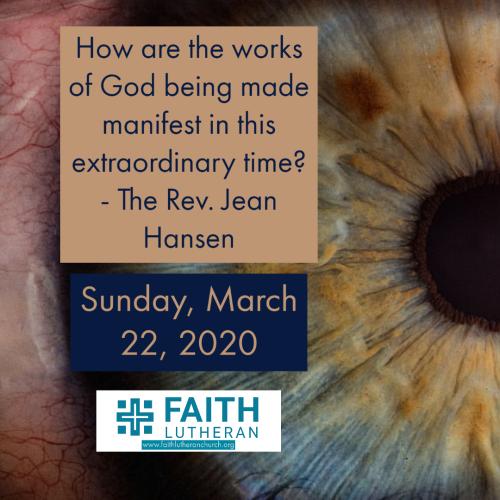
How is God being Made Manifest in Extraordinary Time?
Mar 22, 2020
This week I posted an item on Facebook to add some humor to our rather bleak days. It featured a laptop computer and the message, “Reasons to worship online.” The four reasons listed were: You can wear your pajamas. You don’t have to worry about parking. You can get refills on coffee. And, you can mute the pastor. WELL!
As time passed, there were additions to the list: You don’t have to be on time. You can get snacks. You can go to the bathroom multiple times. And, there was at least one disadvantage given for worshipping online; not being able to play the “distract-the-pastor-so-she-forgets-the-sermon” game. WELL! (Actually, though, being distracted is more likely to happen in this live-stream situation than when I can see your lovely faces before me.)
Here we are – for the second week now, in-person worship has been canceled, and we are maintaining social distance due to the Covid-19 virus. The Church Council also has canceled in-person worship for next Sunday, March 29, and all congregational and community activities in our church building through March 31. Then, the situation will be re-evaluated, and we’ll decide how to proceed.
We all have heard the medical reasons for these measures “ad nauseam,” but for followers of Jesus, it’s easier to explain. This is how we fulfill Jesus’ command to love our neighbor as ourselves. Therefore, we connect as we can, reach out to people in need (our Outreach ministry sent financial support to the Akron-Canton Food Bank this week when we received a plea for support), and are persistent in prayer.
Or, as commentator Matt Skinner wrote, “We are at our best when we imitate Jesus’ pattern to eradicate injustice, extend love and express compassion. Then, we put ourselves on the side of healing – promoting human flourishing and healthy societies.” (1)
Today we encountered another long Gospel lesson, the kind that makes going to get a snack tempting. (Be honest; how many of you did that?) Actually, though, it’s a great story, with a few humorous moments thrown in for good measure.
The account begins with the “blame game,” whose fault is it, this tragedy of the man’s blindness? Did the man himself, or his parents, sin? Jesus will not go there; no one is at fault, yet, the situation is an opportunity for God’s glory to be revealed. The important thing is this – the life-transforming work of God is about to be experienced, made manifest, proving that Jesus IS the light of the world.
Did you notice that the details of the miracle are repeated three times? First, there’s the event itself, when Jesus spat on the ground, made mud with the saliva and spread the mud on the man’s eyes. He then told him to go and wash in the pool of Siloam. He did so and came back able to see.
When there’s a debate among his neighbors about his identity, whether or not he is truly the man who used to sit and beg, the formerly blind man indicates that he is the one, he has to describe how his eyes were opened; the second account of the miracle.
Then, he’s brought before the Pharisees, and for a third time, he tells the story of saliva, mud, and washing in the pool. Some of the religious leaders are hung up on the fact that the healing occurred on the Sabbath, which discredits Jesus, while others struggle with the idea that a Sabbath-breaking sinner could perform such a sign. The solutions must be that he was never blind in the first place! They check out this fact with the formerly blind man’s parents, who affirm the disability, but not the miracle.
At this point, the uneducated formerly blind man gives a theology lesson to the religious leaders, who claim to not know from whom Jesus comes. Is he good or evil? He says, “We know that God does not listen to sinners, but he does listen to one who worships him and obeys his will. Never since the world began has it been heard that anyone opened the eyes of a person born blind. If this man were not from God, he could do nothing.”
And so, he’s driven out by the Pharisees, who are then identified by Jesus as the ones who are truly blind. They do not recognize the grace of God in Jesus; they cannot grasp that the once-blind-man was transformed by astounding, unconditional love.
By the way, Jesus’ astounding, unconditional love is the Gospel lesson’s theme for the third week in a row during this unprecedented Lenten season. It’s a reminder that that love prevails/becomes manifest in the midst of suffering, fear, and the unknown; the church’s role is to stand firm and witness to how God is with us at such times.
In his weekly e-mail, Bishop Allende wrote about a Lutheran pastor in Eilenberg, Germany, named Martin Rinkart. He lived in the 1600s, the time of the Thirty Years War, when the city was over-crowded as people fled from the violence around them. As a result, there was disease and famine, as well as attacks by the armies. At the war’s peak, Pastor Rinkart conducted up to 50 funerals per day, more than 4000 in the year 1637, including his own wife’s.
In the middle of all that strife, he wrote the hymn, “Now Thank We All Our God,” which includes the lyrics, “Who wondrous things has done, in whom the world rejoices.” It’s amazing, isn’t it, that Pastor Rinkart was able to remain so positive, so faithful?
Bishop Allende writes, “The same faith that sustained Pastor Rinkart is the same faith that will sustain us throughout the current crisis. At a time when situations are changing on a daily, even hourly, basis, it is comforting to remember that we serve a God who offers us wholeness and healing through simple faith in Jesus Christ.” (2)
I’m not implying that we are facing such extreme challenges as Pastor Rinkart, but to quote Matt Skinner, “…times of risk and isolation call for active advocacy, compassion and allegiance to one another. Otherwise, why call yourself Christian? And, when we find ourselves helpless to stop the hardships or be agents of healing, we simply bear witness. Like the man in John 9, we just refuse to stop embodying confidently what we believe to be true.” (3)
Additionally, as time passes, our new challenge will be to maintain our focus on compassion and faithfulness rather than being drug into fights about which politicians to blame, who will make up for all the lost capital and chastising those who bought up all the hand sanitizer and toilet paper.
So, the question for today is this: How are the works of God being made manifest in this extraordinary time? What have you noticed? Call someone and share what you’ve experienced, or e-mail, or text, or skype, or twitter. Let me know too so that we can witness together God’s astounding, unconditional love. AMEN






